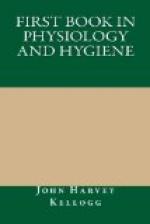3. Eating too Often—Many children make themselves sick by eating too often. It is very harmful to take lunches or to eat at other than the proper meal-times. The stomach needs time to rest, just as our legs and arms and the other parts of the body do. For the same reason, it is well for us to avoid eating late at night. The stomach needs to sleep with the rest of the body. If one goes to bed with the stomach full of food, the stomach cannot rest, and the work of digestion will go on so slowly that the sleep will likely be disturbed. Such sleep is not refreshing.
4. If we wish to keep our digestive organs in good order, we must take care to eat at regular hours. We ought not to eat when we are very tired. The stomach cannot digest well when we are very much fatigued.
5. Sweet Foods.—We ought not to eat too much sugar or sweet foods, as they are likely to sour or ferment in the stomach, and so make us sick. Candies often contain a great many things which are not good for us, and which may make us sick. The colors used in candies are sometimes poisonous. The flavors used in them are also sometimes very harmful.
6. Fatty Foods Hurtful.—Too much butter, fat meats, and other greasy foods are hurtful. Cream is the most digestible form of fat, because it readily dissolves in the fluids of the stomach, and mixes with the other foods without preventing their digestion. Melted fats are especially harmful. Cheese, fried foods, and rich pastry are very poor foods, and likely to cause sickness.
7. Eating too many Kinds of Foods.—Children should avoid eating freely of flesh meats. They ought also to avoid eating all highly-seasoned dishes, and taking too many kinds of food at a meal. A simple diet is much the more healthful. Milk and grain foods, as oatmeal, cracked wheat, graham bread, with such delicious fruits as apples, pears, and grapes, are much the best food for children.
8. Avoid Use of Cold Foods.—We ought not to take very cold foods or liquids with our meals. Cold foods, ice-water, and other iced drinks make the stomach so cold that it cannot digest the food. For this reason it is very harmful to drink iced water or iced tea, or to eat ice-cream at meals. These things are injurious to us at any time, but they do the greatest amount of harm when taken with the food.
9. Things sometimes Eaten which are not Foods.—Things which are not foods are often used as foods, such as mustard, pepper, and the various kinds of seasonings. Soda, saleratus, and baking-powders also belong to this class. All of these substances are more or less harmful, particularly mustard, pepper, and hot sauces.
10. Common Salt.—The only apparent exception to the general rule that all condiments and other substances which are not foods are harmful is in the case of common salt. This is very commonly used among civilized nations, although there are many barbarous tribes that never taste it. It is quite certain that much more salt is used than is needed. When much salt is added to the food, the action of the digestive fluids is greatly hindered. Salt meats, and other foods which have much salt added to them, are hard to digest because the salt hardens the fibres of the meat, so that they are not easily dissolved by the digestive fluids.




